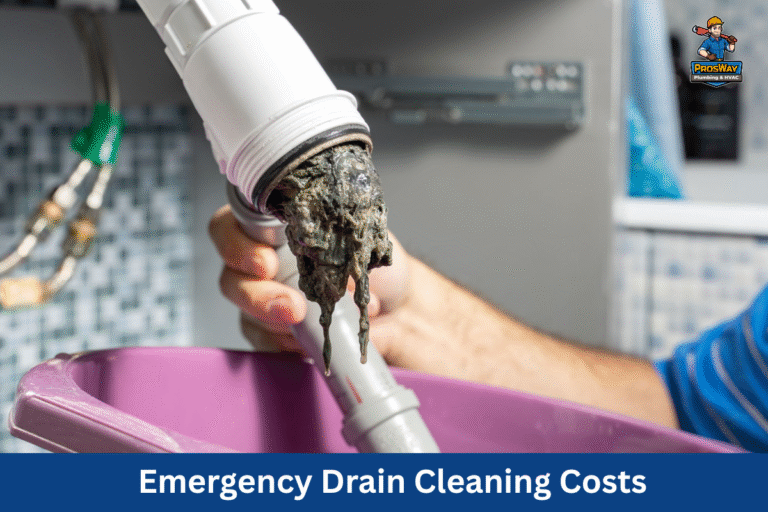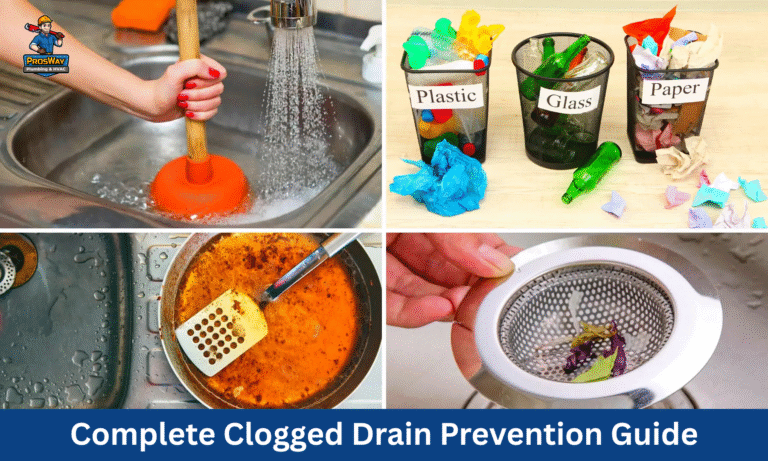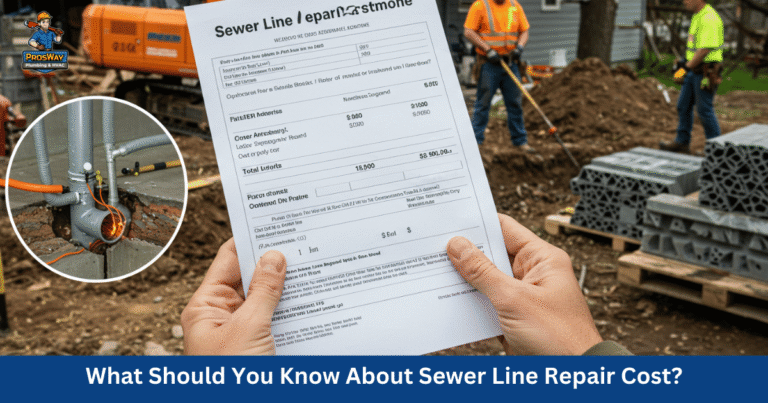Strange noises coming from your drains? Unusual sounds can be an early sign of a clogged drain, and catching the problem early can help you avoid bigger plumbing issues. From gurgling toilets to hissing pipes, knowing these warning signs is key to keeping your plumbing system running smoothly.
This blog post will break down the most common drain noises, what they mean, and how to address them effectively. At ProsWay Plumbing & HVAC, we’ve helped countless homeowners identify clogged drain symptoms and take quick action before small issues turn into costly repairs. Let’s ensure your drains stay clear and quiet!
Key Takeaways
- Unusual drain sounds often indicate plumbing issues that require early detection and action
- Gurgling noises typically signal blockages within the plumbing system that can escalate if ignored
- Homeowners should regularly inspect and maintain their plumbing systems to prevent significant clogs
- High-pitched whistles may hint at leaks that necessitate immediate professional inspection and repair
- Employing natural solutions like baking soda and vinegar can help maintain clear and functional drains.
Identifying Unusual Sounds From Drains

Recognizing unusual sounds from drains is key for homeowners. Gurgling noises often signal a blockage in pipes, while high-pitched whistles might suggest a leak or sewer issue. Below is the detail:
The Different Types of Drain Sounds
Identifying various sounds from drains can prevent significant plumbing issues in homes. For instance, gurgling may indicate a clog forming, while high-pitched whistles could point to a potential leak behind the wall or within the drywall.
By staying familiarized with these noises, homeowners can address drainage problems early, enhancing overall home improvement efforts and ensuring a smoother plumbing experience.
Common Reasons for Gurgling Noises in Pipes
Gurgling noises from pipes often mean a growing blockage. This can happen in various plumbing fixtures, such as sinks, showers, and even sump pumps in the basement.
If a homeowner notices these sounds, it may suggest that water is struggling to pass through the drain, potentially leading to more severe issues if not addressed immediately.
Analyzing High-Pitched Whistles and Their Implications
High-pitched whistles from drain lines often indicate underlying issues within a plumbing system. These sounds can arise from various materials, including copper pipes and metal fixtures.
Places where air leaks or blockages create pressure changes. Homeowners should pay attention to these noises, as they may signal the need for inspection and repair to prevent more significant drainage problems in the future.
The Significance of Bubbling and Hissing Sounds in Drains
Bubbling and hissing sounds from drains are significant indicators of a potential issue in the plumbing system, particularly within a blocked drain line.
These noises may suggest trapped air or water struggling to flow, which can cause complications such as damaged pipes or a malfunctioning water heater.
Homeowners should prioritize troubleshooting these sounds, as ignoring them can worsen into more extensive repairs like pipe hammering or complete blockages.
| Sound | Possible Cause | Recommended Action |
|---|---|---|
| Bubbling | Blocked drain line | Inspect for clogs and clear immediately |
| Hissing | Air leakage | Check joints and seals; repair as necessary |
| Water heater noise | Mineral buildup | Flush the water heater to remove buildup |
Assessing the Impact of Plumbing System Age on Noise Levels
The age of a plumbing system can notably affect noise levels within pipes, which often serve as a warning for clogged drain symptoms.
Older systems may experience more frequent sounds due to wear and tear, increasing the risk of issues such as leaks or blockages in the bathroom area.
Homeowners should be attentive to these noises, as contacting a qualified handyman for quick inspection can prevent further complications and maintain proper drainage performance.
| Age of Plumbing System | Common Sounds | Recommended Action |
|---|---|---|
| Under 10 years | Minimal noise | Routine maintenance |
| 10-20 years | Gurgling, bubbling | Inspect for clogs; consider renovation |
| Over 20 years | Whistles, hissing | Full system assessment; potential replacement |
Recognizing Warning Signs of Clogged Drains

Homeowners need to monitor their drains actively by checking toilet water levels and watching for drainage delays because these signs can reveal clogged drainages.
Also, the release of foul smells with unexpected pipe noises tells homeowners there is an emerging problem beneath the surface. Here’s the detail:
Observing Water Level Changes in Sinks and Toilets
Water level changes in sinks and toilets serve as early warning signs of potential clogs. Homeowners should take note if water rises unusually high or drains slowly.
This is because these changes can indicate underlying issues within the plumbing system. Timely attention to these changes can prevent further complications, such as overflowing fixtures or water damage, which may require the use of a drain cleaner for resolution.
| Observation | Potential Issue | Recommended Action |
|---|---|---|
| High water levels in sink or toilet | Possible blockage in drain | Inspect drainage paths; clear clogs |
| Slow drainage | Partial clog developing | Consider using drain cleaner |
| Frequent overflow incidents | Severe blockage or venting issue | Contact plumbing professional |
Noticing Slow Drainage Patterns Over Time
Noticing slow drainage patterns over time often serves as an essential warning sign of potential clogs within the sewer line.
Homeowners should pay attention to drains that take longer than usual to empty, as this symptom may specify a buildup affecting pipes, potentially extending to areas near joists or ceilings.
Timely leak detection can help prevent minor issues from intensifying into significant problems, avoiding costly repairs and maintaining the integrity of the plumbing system.
Detecting Foul Odors Along With Unusual Sounds
Noticing foul smells alongside unusual sounds from drains indicates possible clogs or other significant plumbing issues.
Homeowners often notice a musty or sewage-like smell when a drain is hindered, which suggests standing water or debris is trapped within the pipes.
Addressing both the noise and the smell instantly can help prevent more severe plumbing complications and restore efficient drainage in the home.
| Warning Signs | Potential Issue | Recommended Action |
|---|---|---|
| Unusual sounds with foul odors | Possible drain blockage | Inspect the drain and clear any obstructions |
| Lingering bad smells | Stagnant water | Contact a plumbing professional for assessment |
| Frequent gurgling or bubbling | Ventilation issues | Check vents and drain paths for blockages |
Evaluating the Frequency of Noise Occurrences
Evaluating the frequency of noise occurrences from drains is essential for homeowners to identify potential plumbing issues early.
Regular and increasingly loud sounds, such as gurgling and bubbling, may signify developing clogs that require immediate attention.
Homeowners who observe these noises can take preventive measures, such as clearing drains or seeking professional assistance, thus avoiding both more significant problems and costly repairs.
The Risks of Ignoring Drain Symptoms
Ignoring the symptoms of clogged drains can lead to significant consequences for homeowners. Persistent gurgling noises or foul smells often signal deeper plumbing issues that can increase into costly repairs if not addressed swiftly.
By recognizing these warning signs and taking timely action, individuals can avoid extensive damage to their home and ensure their plumbing system operates efficiently.
When drains begin to gurgle or hiss, it’s time to listen closely. These unusual noises may hold clues to deeper problems waiting to be uncovered.
Investigating Causes Behind Unusual Drain Noises

Blockages that cause gurgling effects are crucial for addressing plumbing issues effectively. Knowing how air traps lead to hissing sounds can also provide valuable insights.
Additionally, analyzing ventilation issues and investigating plumbing design flaws help pinpoint reasons behind unusual drain noises.
Identifying Blockages Causing Gurgling Effects
Typically, gurgling sounds that arise from drains indicate blockages within the plumbing system.
Homeowners should pay close attention to these noises, as they often signify that water is struggling to pass through.
This leads to increased pressure and potential overflow. Identifying these blockages quickly can prevent further complications, such as pipe damage, by implementing necessary inspections and clear-out actions before severe issues arise.
How Air Traps Lead to Hissing Sounds?
Hissing sounds in drains often result from air pockets that develop due to blockages. As water struggles to flow past these obstructions, it creates a vacuum effect, causing air to be forced through narrow spaces, which produces the hissing noise.
Homeowners experiencing this sound should investigate their plumbing, as addressing these issues early can prevent more serious drainage complications and maintain system efficiency.
Ventilation Issues Contributing to Drain Noise
Ventilation issues can significantly contribute to unusual drain noise, particularly gurgling and hissing sounds.
Proper ventilation is essential for maintaining consistent drainage flow and preventing air from getting trapped in pipes.
When vents become clogged or obstructed, it can lead to pressure imbalances, creating noise that signals potential plumbing problems.
So, addressing these issues instantly helps ensure the plumbing system operates smoothly and avoids more serious complications.
Plumbing Design Flaws as a Source of Sounds
Investigating plumbing design flaws is crucial in understanding the origins of unusual drain noises. Poorly designed pipe layouts, such as excessive bends or inadequate slope, can create traps for air and water.
This paves the way to noticeable sounds like gurgling or hissing. Homeowners should consider having a professional evaluate their plumbing system to identify any design issues that may be contributing to these symptoms, thereby preventing further complications related to clogged drains.
Recognizing the Role of Drainage Materials in Noise Generation
The choice of drainage materials plays a significant role in noise generation within plumbing systems. For instance, older cast iron pipes may create different sound profiles compared to modern PVC counterparts.
When materials vibrate due to flowing water or trapped air, they can raise sounds like gurgling or hissing, indicating potential clogs or issues in the system.
Sometimes, a clogged drain can make these noises even louder:
| Drainage Material | Common Noises | Implications |
|---|---|---|
| Cast Iron | Rattling, Gurgling | Possible clogs or wear |
| PVC | Hissing, Bubbling | Air trapped or blockages |
| Copper | Whistling, Clanging | Leaks or pressure changes |
Taking Action for Unusual Drain Sounds
Homeowners facing unusual drain sounds can address these issues through simple DIY solutions aimed at unclogging drains effectively. Below is the detail:
Simple DIY Solutions for Clogged Drain Issues
Homeowners can manage clogged drain issues using simple DIY solutions that are both effective and practical.
One common approach involves using a mixture of baking soda and vinegar to break down blockages, as the chemical reaction helps remove waste.
Another method is using a plunger to create suction, which can release minor clogs in sinks and toilets. For more stubborn issues, a plumber’s snake can help reach and clear deeper obstructions in the pipes.
Taking timely action against unusual drain sounds can prevent further complications and ensure the plumbing system remains in good condition.
For a visual demonstration of unclogging different types of drains, check out this helpful video: How to Unclog Any Drain
When to Seek Professional Plumbing Assistance
Homeowners should seek professional plumbing help when unusual drain sounds persist or worsen over time.
If gurgling, hissing, or bubbling noises continue despite attempts to resolve minor clogs, it may indicate a more significant issue within the plumbing system.
Experts can conduct thorough inspections to identify hidden problems and provide effective solutions, safeguarding the integrity of the home’s plumbing.
- Monitor unusual sounds from drains consistently.
- Take note of changes in drainage patterns.
- Act promptly if DIY solutions do not resolve the issue.
- Contact a professional for a comprehensive inspection when symptoms persist.
- Prioritize regular maintenance to prevent future issues.
The Costs Accepted for Professional Help
Knowing the costs accepted for professional plumbing help is essential for homeowners facing unusual drain sounds.
Typically, plumbing services may charge a flat fee for inspections, while repairs could vary based on the severity of the issue.
Homeowners should be prepared for potential expenses related to the complexity of the problem, including any needed parts or emergency service fees.
Because addressing clogged drains sooner rather than later can prevent more extensive damage and higher costs in the long run.
Evaluating Regular Maintenance Practices for Drains
Regular scheduled maintenance practices for drains are crucial for preventing clogs and ensuring smooth operation.
Homeowners should schedule periodic inspections to identify potential issues before they worsen. Using tools such as drain snakes or natural solutions like baking soda and vinegar can help maintain clear pipes and eliminate buildup.
Ultimately this reduces the frequency of unusual drain sounds and keeps plumbing systems efficient.
| Maintenance Practice | Benefit | Recommended Frequency |
|---|---|---|
| Periodic Inspections | Identify potential issues early | Every six months |
| Drain Snaking | Clears stubborn clogs | As needed |
| Baking Soda & Vinegar Treatment | Maintains clear pipes | Monthly |
Preventive Measures to Avoid Future Clogged Drains

Implementing regular drain cleaning routines is vital for maintaining plumbing systems. Homeowners should avoid common items that lead to blockages and educate household members about proper drain use.
Implementing Regular Drain Cleaning Routines
Implementing regular drain cleaning routines is essential for maintaining a healthy plumbing system and preventing clogged drains.
Homeowners should establish a consistent schedule for cleaning their drains, which can include using natural ingredients like baking soda and vinegar to break down buildup.
By prioritizing these practices, individuals can minimize the risk of future issues, ensuring efficient water flow and reducing the chances of those warning sounds that indicate problems.
| Action | Frequency | Benefits |
|---|---|---|
| Clean drains with baking soda & vinegar | Monthly | Prevents buildup and clogs |
| Inspect drains for potential issues | Every six months | Identifies problems early |
| Clear debris from drain covers | As needed | Reduces blockages |
Avoiding Common Items That Cause Blockages
Avoiding common items that cause blockages is essential for maintaining the drain clearing and preventing the need for costly repairs.
Homeowners should avoid disposing of grease, hair, and food particles down the sink, as these materials can gather and lead to clogs over time.
The implementation of simple habits, such as using drain strainers and properly disposing of waste, can help significantly reduce the risk of encountering clogged drain symptoms and ensure their plumbing system remains efficient.
Educating Household Members on Proper Drain Use
Educating household members on proper drain use is necessary for preventing clogged drains and their associated symptoms.
Everyone in the home should understand the importance of avoiding the disposal of items like grease, hair, and food particles down the sink, as these can lead to significant blockages.
By promoting easy-to-follow practices and encouraging the use of drain strainers, homeowners can promote collective responsibility for maintaining the plumbing system, ultimately reducing the risk of encountering those irritating warning sounds from the drains.
Assessing the Importance of Routine Plumbing Inspections
Routine plumbing inspections play a critical role in preventing clogged drains and identifying warning sounds early.
By scheduling regular check-ups with a professional, homeowners can uncover potential issues, such as hidden blockages or worn-out pipes, that may not be apparent during everyday use.
This proactive approach enhances the overall functionality of the plumbing system and saves homeowners from costly repairs associated with severe clogs.
- Establish a schedule for routine plumbing inspections.
- Identify potential issues before they escalate.
- Prevent the stress and drain unclogging costs.
Adopting Eco-Friendly Products for Drain Maintenance
Adopting eco-friendly products for drain maintenance helps homeowners contribute positively to the environment while effectively managing their plumbing systems.
Natural solutions, such as baking soda and vinegar, break down buildup without harmful chemicals, promoting safer drainage practices.
By incorporating these eco-friendly methods into regular maintenance, homeowners can reduce the risk of clogs and ensure a healthier plumbing system, benefiting both their homes and the planet:
Encouraging Sharing Experiences With Drain Issues
Encouraging homeowners to share their experiences with drain issues can promote a sense of community and collective learning.
Discussing symptoms like gurgling sounds or slow drainage can help identify common problems and lead to quicker solutions.
By exchanging insights, individuals can feel more empowered to check their plumbing systems effectively and address potential clog situations before they increase into serious repairs.
Acknowledging the Role of Awareness in Preventing Clogs
The role of awareness in preventing clogs is important for homeowners seeking to maintain effective plumbing systems.
By staying active to unusual sounds like gurgling or hissing, individuals can identify potential issues before they develop into severe complications, saving time and costs associated with extensive repairs.
Conclusion
Hearing gurgling, bubbling, or hissing from your drains? These clogged drain symptoms are early warnings that shouldn’t be ignored! Catching drainage issues early can prevent costly repairs, water damage, and major plumbing headaches. With regular maintenance and a little awareness, you can keep your drains clear and your plumbing running smoothly.
Schedule Your Service Today!
Don’t wait for a minor clog to turn into a major plumbing problem! Let ProsWay Plumbing & HVAC tackle the problem before it gets worse. Call us now or Book Online for fast, reliable drain solutions—because smooth-flowing pipes mean a stress-free home!









